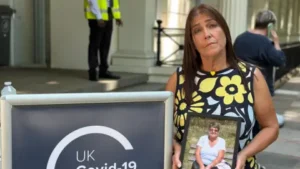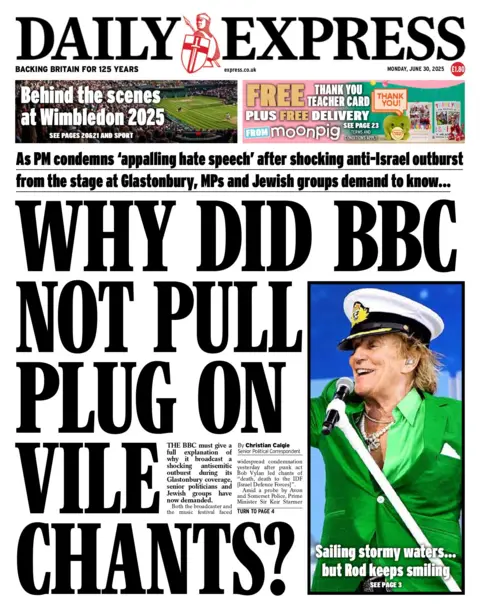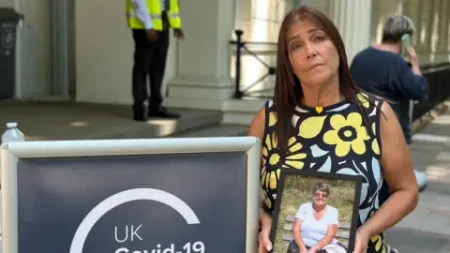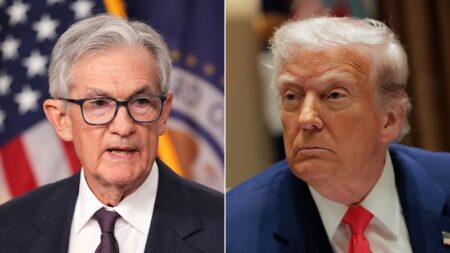The recent controversy surrounding the BBC and the punk duo Bob Vylan has sparked heated debates across the British media landscape. Most prominently, this discussion pertains to a performance broadcasted during the Glastonbury Festival where Vylan chanted “death to the IDF,” inciting widespread backlash. Following this event, the BBC faced mounting pressure to justify its decision to air the performance, with numerous media outlets questioning why it did not intervene during what many considered “vile chants.”
One of the central criticisms emerged from the Daily Express, which led with the question, “Why did BBC not pull plug on vile chants?” This headline encapsulates the outrage directed towards the broadcaster for permitting what many perceive as hate speech to be aired without immediate consequences. A spokesperson for the BBC acknowledged that some comments made during the performance were “deeply offensive,” but clarified that a warning was displayed on screen regarding the “very strong and discriminatory language.” Moreover, the BBC announced there are no plans to make the performance available on iPlayer, indicating a recognition of the sensitive nature of the content.
Political figures have also taken notice of the situation, notably Shadow Home Secretary Chris Philp, who was cited by the Daily Mail voicing that BBC executives should potentially face legal consequences for their decision. This perspective was echoed by the Daily Telegraph, emphasizing that, in addition to the broadcaster, Vylan himself should be prosecuted for inciting violence through his lyrics. The underlying current in these critiques hints at a larger discourse on freedom of speech versus hate speech and the roles institutions like the BBC play in navigating these complex issues.
Adding to the complexity, the former head of BBC Television, Danny Cohen, provided a salient perspective in the Times, arguing that it is the audience’s response, particularly the mass display of violent intent towards Jews, that should be most disturbing. He remarked that this event signals a societal problem where “murderous hate was celebrated,” and questioned why racism against Jews appears to be currently acceptable when other forms of racism are condemned.
This incident at Glastonbury not only overshadowed performances, such as Sir Rod Stewart’s iconic set, but it also coincided with significant societal discussions surrounding governmental policies. Among these discussions was the ongoing parliamentary vote concerning proposed welfare reforms, highlighted by the Financial Times, which reported that despite some adaptations being made to the bill, tensions remain high within the Labour party regarding the extent of these reforms. Vicky Foxcroft, a Labour MP who previously resigned over the welfare cuts, continues to advocate for concessions that address the needs of vulnerable populations.
Meanwhile, in the midst of these political narratives, another story slow-burned within the headlines: the impending heatwave expected to engulf the UK, humorously dubbed “Meltdown Monday” by the Daily Star. Local papers forecasted that Monday could potentially become the hottest day of the year, prompting various reactions across social media and public discourse. This weather narrative juxtaposes the weighty political conversations, creating an overall atmosphere of uncertainty and reflection across British society.
As the nation witnesses these converging stories of cultural discontent, political scrutiny, and climatic extremes, the engagement with topics like freedom of expression, institutional responsibility, and societal values become increasingly pressing. Each newspaper portrays a different aspect of this multifaceted situation, reflecting the varied angles from which the public is invited to engage in dialogue.
The BBC, facing this complex web of criticism and concern, now finds itself at a crucial juncture where its responses may shape future discourse regarding not only media responsibility but also public acceptance of expressions that straddle the line between artistic freedom and hate speech.











